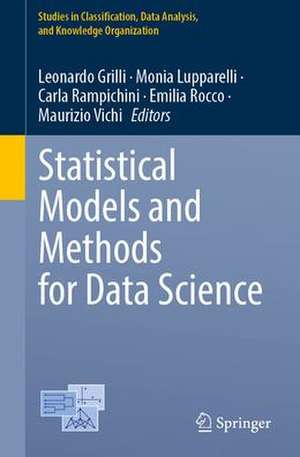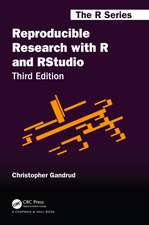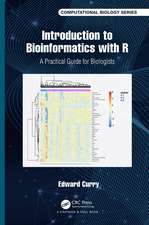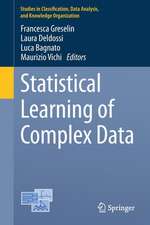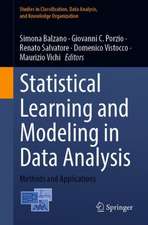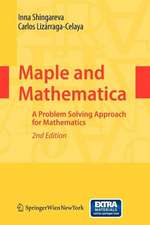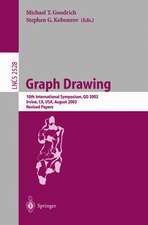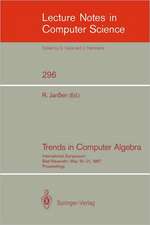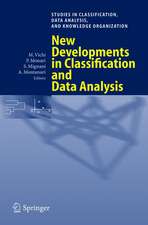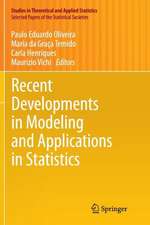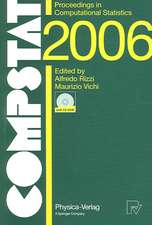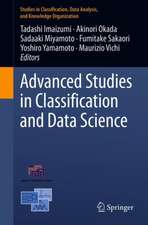Statistical Models and Methods for Data Science: Studies in Classification, Data Analysis, and Knowledge Organization
Editat de Leonardo Grilli, Monia Lupparelli, Carla Rampichini, Emilia Rocco, Maurizio Vichien Limba Engleză Paperback – 25 iul 2023
The contents comprise selected and peer-reviewed contributions presented at the 13th Scientific Meeting of the Classification and Data Analysis Group of the Italian Statistical Society, CLADAG 2021, held (online) in Florence, Italy, on September 9–11, 2021. CLADAG promotes advanced methodological research in multivariate statistics with a special focus on data analysis and classification, and supports the exchange and dissemination of ideas, methodological concepts, numerical methods, algorithms, and computational and applied results at the interface between classification and data science.
Din seria Studies in Classification, Data Analysis, and Knowledge Organization
- 20%
 Preț: 754.09 lei
Preț: 754.09 lei - 20%
 Preț: 1203.30 lei
Preț: 1203.30 lei -
 Preț: 389.49 lei
Preț: 389.49 lei - 20%
 Preț: 587.28 lei
Preț: 587.28 lei - 18%
 Preț: 886.26 lei
Preț: 886.26 lei - 15%
 Preț: 654.43 lei
Preț: 654.43 lei - 18%
 Preț: 968.30 lei
Preț: 968.30 lei - 18%
 Preț: 1017.26 lei
Preț: 1017.26 lei -
 Preț: 417.41 lei
Preț: 417.41 lei - 18%
 Preț: 1113.09 lei
Preț: 1113.09 lei - 15%
 Preț: 645.14 lei
Preț: 645.14 lei - 15%
 Preț: 660.04 lei
Preț: 660.04 lei - 20%
 Preț: 583.37 lei
Preț: 583.37 lei - 15%
 Preț: 637.59 lei
Preț: 637.59 lei -
 Preț: 406.05 lei
Preț: 406.05 lei - 20%
 Preț: 997.38 lei
Preț: 997.38 lei - 18%
 Preț: 958.07 lei
Preț: 958.07 lei - 18%
 Preț: 949.06 lei
Preț: 949.06 lei - 18%
 Preț: 784.13 lei
Preț: 784.13 lei - 20%
 Preț: 999.53 lei
Preț: 999.53 lei - 18%
 Preț: 1391.52 lei
Preț: 1391.52 lei - 15%
 Preț: 657.25 lei
Preț: 657.25 lei - 18%
 Preț: 964.10 lei
Preț: 964.10 lei - 18%
 Preț: 962.35 lei
Preț: 962.35 lei - 15%
 Preț: 649.71 lei
Preț: 649.71 lei - 20%
 Preț: 1013.06 lei
Preț: 1013.06 lei - 15%
 Preț: 652.81 lei
Preț: 652.81 lei - 15%
 Preț: 647.73 lei
Preț: 647.73 lei - 20%
 Preț: 585.29 lei
Preț: 585.29 lei - 24%
 Preț: 795.77 lei
Preț: 795.77 lei - 20%
 Preț: 1464.66 lei
Preț: 1464.66 lei - 20%
 Preț: 559.43 lei
Preț: 559.43 lei - 15%
 Preț: 647.59 lei
Preț: 647.59 lei - 15%
 Preț: 650.04 lei
Preț: 650.04 lei - 15%
 Preț: 647.73 lei
Preț: 647.73 lei -
 Preț: 398.15 lei
Preț: 398.15 lei - 20%
 Preț: 572.08 lei
Preț: 572.08 lei - 15%
 Preț: 639.59 lei
Preț: 639.59 lei - 15%
 Preț: 683.40 lei
Preț: 683.40 lei - 15%
 Preț: 695.01 lei
Preț: 695.01 lei -
 Preț: 423.34 lei
Preț: 423.34 lei - 18%
 Preț: 945.30 lei
Preț: 945.30 lei - 15%
 Preț: 652.64 lei
Preț: 652.64 lei -
 Preț: 391.40 lei
Preț: 391.40 lei - 20%
 Preț: 561.11 lei
Preț: 561.11 lei - 20%
 Preț: 1002.67 lei
Preț: 1002.67 lei - 15%
 Preț: 640.37 lei
Preț: 640.37 lei - 20%
 Preț: 996.88 lei
Preț: 996.88 lei - 20%
 Preț: 1007.46 lei
Preț: 1007.46 lei - 15%
 Preț: 646.11 lei
Preț: 646.11 lei
Preț: 776.40 lei
Preț vechi: 946.83 lei
-18% Nou
Puncte Express: 1165
Preț estimativ în valută:
148.57€ • 155.43$ • 123.41£
148.57€ • 155.43$ • 123.41£
Carte tipărită la comandă
Livrare economică 03-17 aprilie
Preluare comenzi: 021 569.72.76
Specificații
ISBN-13: 9783031301636
ISBN-10: 3031301633
Pagini: 188
Ilustrații: VIII, 188 p. 32 illus., 19 illus. in color.
Dimensiuni: 155 x 235 mm
Greutate: 0.28 kg
Ediția:1st ed. 2023
Editura: Springer International Publishing
Colecția Springer
Seria Studies in Classification, Data Analysis, and Knowledge Organization
Locul publicării:Cham, Switzerland
ISBN-10: 3031301633
Pagini: 188
Ilustrații: VIII, 188 p. 32 illus., 19 illus. in color.
Dimensiuni: 155 x 235 mm
Greutate: 0.28 kg
Ediția:1st ed. 2023
Editura: Springer International Publishing
Colecția Springer
Seria Studies in Classification, Data Analysis, and Knowledge Organization
Locul publicării:Cham, Switzerland
Cuprins
Clustering financial time series by dependency.- The Homogeneity Index as a Measure of Interrater Agreement for Ratings on a Nominal Scale.- Hierarchical clustering of income data based on share densities.- Optimal Coding of High Cardinality Categorical Data in Machine Learning.- Bayesian Multivariate Analysis of Mixed data.- Marginals matrix under a generalized Mallows model based on the power divergence.- Time series clustering based on forecast distributions: an empirical analysis on production indices for construction.- Partial Reconstruction of Measures from Halfspace Depth.- Posterior Predictive Assessment of IRT Models via the Hellinger Distance: A Simulation Study.- Shapley Lorenz values for credit risk management.- A study of lack-of-fit diagnostics for models fit to cross-classified binary variables.- Robust Response Transformations for Generalized Additive Models via Additivity and Variance Stabilisation.- A Random-Coefficients Analysis with a Multivariate Random-Coefficients Linear Model.- Parsimonious mixtures of matrix-variate shifted exponential normal distributions.
Notă biografică
Leonardo Grilli is a Full Professor of Statistics at the University of Florence, Italy and the Director of the Master’s program in Statistics and Data Science and a member of the board of the Doctoral Program in Development Economics and Local Systems. His teaching activity focuses on introductory statistics and statistical modelling, including generalized linear models and multilevel models. His research mainly concerns random effects models for multilevel analysis, with methodological advances about the specification and estimation of models in complex frameworks such as duration data, multivariate qualitative responses, informative sampling designs, and sample selection bias. He has also made contributions to causal inference in the potential outcomes framework, IRT models, latent growth curve models, mixture models, and quantile regression.
Monia Lupparelli is an Associate Professor of Statistics at the University of Florence, Italy, and a member of the boardof the Doctoral Program in Statistics at the University of Bologna. She teaches the foundations of statistics and of statistical modelling in bachelor’s and master’s degree programs. She also gives specialised courses on graphical models and categorical data analysis for doctoral and post-doctoral students. Her research activity is mainly grounded in network modelling, latent variable models, and marginal models with applications to the analysis of longitudinal and categorical data in social and biomedical sciences.
Carla Rampichini is a Full Professor of Statistics and Head of the Department of Statistics, Computer science, and Applications at the University of Florence, Italy. Her teaching activity focuses on introductory statistics, multivariate analysis and statistical modelling. Her research interests relate to random effects models for multilevel analysis, program evaluation, and causal inference. Her methodological work is joined with applications often concerning the effectiveness of universities. She is a member of the Royal Statistical Society and the Italian Statistical Society. She is the Editor-in-Chief of Statistical Methods and Applications.
Emilia Rocco is an Associate Professor of Statistics at the University of Florence, Italy. Her teaching activity focuses on introductory statistics and survey sampling theory and applications. Her research interests relate to informative and not-informative sample designs useful for studying rare and clustered populations, capture-recapture methodologies, methods of treatment of nonresponse, indicators of representativeness for monitoring the risk of selection bias when non-response or a convenience sample occurs, small area estimation methods, geoadditive models and their applications to the analysis of environmental and socio-economic phenomena. She is a member of the International Association of Survey Statisticians and of the Italian Statistical Society.
Maurizio Vichi is a Full Professor of Statistics at Sapienza University of Rome, Italy, and Head of the Department of Statistical Sciences. He is the founding President and current Vice-President of the Federation of European National Statistical Societies, and a former President of the Italian Statistical Society and the International Federation of Classification Societies. He is also Coordinating Editor of the international journal Advances in Data Analysis and Classification and Acting Chair of the European Statistical Advisory Committee of the EU. He teaches on multivariate statistics and data analysis and statistical modeling and is the author of more than 150 papers, mainly on new multivariate statistical methods for data analysis, including Big Data and statistical tools for decision making.
Monia Lupparelli is an Associate Professor of Statistics at the University of Florence, Italy, and a member of the boardof the Doctoral Program in Statistics at the University of Bologna. She teaches the foundations of statistics and of statistical modelling in bachelor’s and master’s degree programs. She also gives specialised courses on graphical models and categorical data analysis for doctoral and post-doctoral students. Her research activity is mainly grounded in network modelling, latent variable models, and marginal models with applications to the analysis of longitudinal and categorical data in social and biomedical sciences.
Carla Rampichini is a Full Professor of Statistics and Head of the Department of Statistics, Computer science, and Applications at the University of Florence, Italy. Her teaching activity focuses on introductory statistics, multivariate analysis and statistical modelling. Her research interests relate to random effects models for multilevel analysis, program evaluation, and causal inference. Her methodological work is joined with applications often concerning the effectiveness of universities. She is a member of the Royal Statistical Society and the Italian Statistical Society. She is the Editor-in-Chief of Statistical Methods and Applications.
Emilia Rocco is an Associate Professor of Statistics at the University of Florence, Italy. Her teaching activity focuses on introductory statistics and survey sampling theory and applications. Her research interests relate to informative and not-informative sample designs useful for studying rare and clustered populations, capture-recapture methodologies, methods of treatment of nonresponse, indicators of representativeness for monitoring the risk of selection bias when non-response or a convenience sample occurs, small area estimation methods, geoadditive models and their applications to the analysis of environmental and socio-economic phenomena. She is a member of the International Association of Survey Statisticians and of the Italian Statistical Society.
Maurizio Vichi is a Full Professor of Statistics at Sapienza University of Rome, Italy, and Head of the Department of Statistical Sciences. He is the founding President and current Vice-President of the Federation of European National Statistical Societies, and a former President of the Italian Statistical Society and the International Federation of Classification Societies. He is also Coordinating Editor of the international journal Advances in Data Analysis and Classification and Acting Chair of the European Statistical Advisory Committee of the EU. He teaches on multivariate statistics and data analysis and statistical modeling and is the author of more than 150 papers, mainly on new multivariate statistical methods for data analysis, including Big Data and statistical tools for decision making.
Textul de pe ultima copertă
This book focuses on methods and models in classification and data analysis and presents real-world applications at the interface with data science. Numerous topics are covered, ranging from statistical inference and modelling to clustering and factorial methods, and from directional data analysis to time series analysis and small area estimation. The applications deal with new developments in a variety of fields, including medicine, finance, engineering, marketing, and cyber risk.
The contents comprise selected and peer-reviewed contributions presented at the 13th Scientific Meeting of the Classification and Data Analysis Group of the Italian Statistical Society, CLADAG 2021, held (online) in Florence, Italy, on September 9–11, 2021. CLADAG promotes advanced methodological research in multivariate statistics with a special focus on data analysis and classification, and supports the exchange and dissemination of ideas, methodological concepts, numerical methods, algorithms, and computational and applied results at the interface between classification and data science.
The contents comprise selected and peer-reviewed contributions presented at the 13th Scientific Meeting of the Classification and Data Analysis Group of the Italian Statistical Society, CLADAG 2021, held (online) in Florence, Italy, on September 9–11, 2021. CLADAG promotes advanced methodological research in multivariate statistics with a special focus on data analysis and classification, and supports the exchange and dissemination of ideas, methodological concepts, numerical methods, algorithms, and computational and applied results at the interface between classification and data science.
Caracteristici
Focuses on modern statistical methods and models for data science Presents real-world applications in medicine, finance, engineering, marketing, and cyber risk Fosters new directions of research in classification and data analysis
